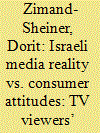| Srl | Item |
| 1 |
ID:
115171


|
|
|
|
|
| Publication |
2012.
|
| Summary/Abstract |
Electric Vehicles (EVs) are promoted as a viable near-term vehicle technology to reduce dependence on fossil fuels and resulting greenhouse gas (GHG) emissions associated with conventional vehicles (CVs). In spite of the benefits of EVs, several obstacles need to be overcome before EVs will be widely adopted. A major barrier is that consumers tend to resist new technologies that are considered alien or unproved, thus, policy decisions that consider their critical concerns will have a higher level of success. This research identifies potential socio-technical barriers to consumer adoption of EVs and determines if sustainability issues influence consumer decision to purchase an EV. This study provides valuable insights into preferences and perceptions of technology enthusiasts; individuals highly connected to technology development and better equipped to sort out the many differences between EVs and CVs. This group of individuals will likely be early adopters of EVs only if they perceive them to be superior in performance compared to CVs. These results can guide policymakers in crafting energy and transportation policy. It can also provide guidance to EV engineers' decision in incorporating consumer preference into EV engineering design.
|
|
|
|
|
|
|
|
|
|
|
|
|
|
|
|
| 2 |
ID:
177446


|
|
|
|
|
| Summary/Abstract |
While several countries progress in the energy transition, the social acceptance of new infrastructures becomes increasingly important. We focus on market acceptance, and study the preferences of Swiss households with respect to selected energy sources used for electricity generation. By applying a hybrid discrete choice model with latent variables on stated preference data, we assess households’ preferences with respect to the price, origin, and reliability of their electricity supply, and evaluate the impact of demographic, behavioural, and attitudinal drivers thereon. Latent variables representing attitudes allow us to explicitly model psychological traits otherwise unobservable from the data, evaluate their impact on individual choices, and connect them with demographic or behavioural variables. We find that households evaluate variations in the price and reliability of supply differently, depending on the energy source used. Environmental concern is associated to a stronger interest in a generic 100% renewable-based supply, informed optimism to a higher acceptance of nuclear generation. Energy illiteracy and environmental-friendly habits are more frequent among environmentally conscious households, less so among the informed optimists. Measures to foster energy literacy and ensure transparency of energy supply contracts are recommended in order to elicit or maintain consensus, and achieve the desired energy policy goals.
|
|
|
|
|
|
|
|
|
|
|
|
|
|
|
|
| 3 |
ID:
164328


|
|
|
|
|
| Summary/Abstract |
Covert advertising such as embedded paid content (EPC) is flourishing on Israeli TV, but in most cases regulators’ prohibiting rules are not enforced. Though the regulators’ role is to safeguard the public’s right to know, the public’s attitudes and ethical perceptions of EPC on TV is not being addressed. The current survey is an initial attempt to discover TV viewers’ attitudes towards EPC. While respondents’ attitudes towards product placement were indifferent, their attitudes towards EPC were generally negative. Results indicate that after being informed regarding paid TV content, respondents considered EPC to be culturally acceptable in Israeli (relativism), but morally unethical (moral equity). They also considered EPC a violation of the unwritten contract with media creators regarding the authenticity of media content (contractualism). Findings suggest that the Israeli public should be better informed regarding EPC and should be taken into consideration when dealing with its use, regulation and enforcement.
|
|
|
|
|
|
|
|
|
|
|
|
|
|
|
|